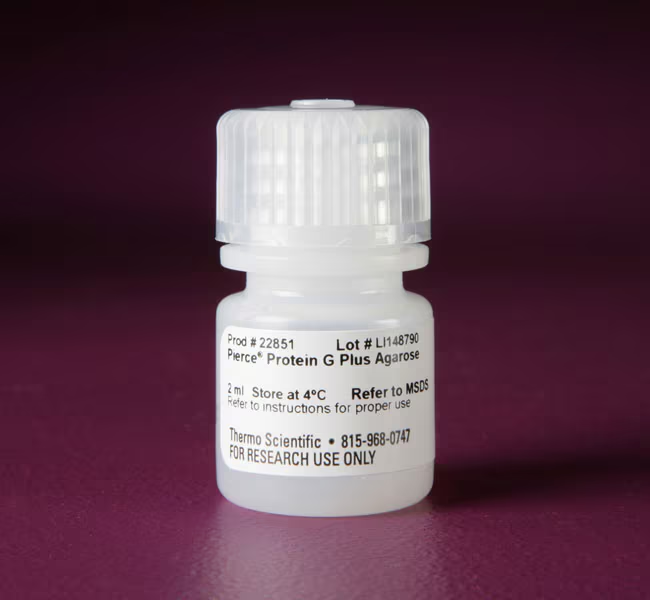
Thermo Scientific Pierce Protein G Plus Agarose is a high-capacity Protein G beaded agarose resin for use in a variety of antibody affinity purification methods.
Features of Protein G Plus Agarose:
• Protein G – immobilized Protein G is ideal for polyclonal IgG purification from mouse, human, cow, goat and sheep serum, including human IgG3 and mouse IgG1 isotypes
• Agarose resin – support is crosslinked 6% beaded agarose (CL-6B), the most popular resin for protein affinity purification methods
• Inert and stable – superior manufacturing method immobilizes Protein G by charge-free, leach-resistant covalent bonds, resulting in low nonspecific binding and enabling multiple uses without decline in yield
• High capacity – this “Plus” variety of Pierce Protein G Agarose has a dense load of immobilized Protein G, providing a binding capacity greater than 20 mg human IgG/mL resin
Pierce Protein G Plus Agarose consists of recombinant Protein G that has been covalently immobilized at high density onto high-quality crosslinked 6% beaded agarose (CL-6B). The resin is effective for affinity purification of IgG from serum and other fluids of many mammalian species. Protein G is especially well suited for use with mouse antibodies (including mouse IgG1) in addition to most IgG isotypes from human, goat and sheep samples.
Protein G is a bacterial cell wall protein original from group G Streptococcus and now produced as a recombinant in E. coli. Like Protein A, Protein G binds to most mammalian immunoglobulins primarily through their Fc regions. Native Protein G contains two immunoglobulin binding sites, as well as albumin and cell surface binding sites. In the recombinant form of Protein G, these albumin and cell surface binding sites have been eliminated to reduce nonspecific binding when purifying immunoglobulins. Recombinant Protein G has a mass of approximately 21.6kDa, but its apparent size by SDS-PAGE is 31 to 34kDa. IgG-binding function is optimal at pH 5 but also occurs efficiently in near-neutral conditions (pH 7.0 to 7.2).
Compared to Protein A, Protein G binds a broader spectrum of IgG subclasses from human, mouse and rat serum. In particular, besides binding other isotypes just as well as Protein A, Protein G exhibits stronger binding to human IgG3, mouse IgG1 and all three isotypes of Rat IgG. Thus, Protein G is generally recommended for applications involving these species and isotypes of antibody. With regard to other species, Protein G provides higher-capacity binding for IgG from cow, goat and sheep, but it binds more weakly than Protein A to pig, guinea pig, dog and cat IgG.
Pierce Protein G Plus Agarose is prepared using Thermo Scientific AminoLink* Coupling Chemistry, which provides several advantages compared to traditional methods of ligand immobilization. AminoLink Immobilization results in conjugation between sugar monomers of the agarose beads and native lysine residues on the Protein A via simple amide bonds. Unlike typical cyanogen bromide (CNBr) immobilization, the AminoLink Method does not introduce any novel chemical groups that could cause undesired nonspecific binding and produces a stable, essentially irreversible bond. The result is a high-binding-capacity resin that retains functional immobilized Protein G through multiple rounds of antibody purification.
Properties of crosslinked 6% beaded agarose (CL-6B):
• Support pH Stability: 2 to 14 (short term); 3 to 13 (long term)
• Average Particle Size: 45 to 165 microns
• Exclusion Limit: 10,000 to 4,000,000 daltons
• Maximum Volumetric Flow Rate: approx. 1 mL/minute (for 1 cm diameter column)
• Maximum Linear Velocity: 30 cm per hour
• Maximum Pressure: less than 25psi (1.5 bar), defined as the maximum pressure drop across a column that the resin can withstand (Note: The indicated gauge pressure of a liquid chromatography apparatus may be measuring the total system pressure rather than the pressure drop across the column.)
Related Products
Pierce™ Protein G Agarose
| Code | Description |
|---|---|
| 22851 | Catalog Number: 22851 |
| 22852 | Catalog Number: 22852 |

